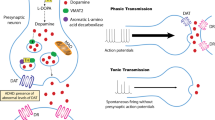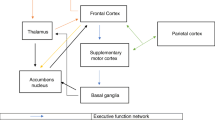Summary.
Dopa responsive dystonia (DRD) is an autosomal dominant dystonia caused by mutations in the gene GCH1 in about 50% of cases. GCH1 codes for GTP cyclohydrolase I, a rate limiting enzyme in the synthesis of tetrahydrobiobterin (BH4) from GTP. There is reduced penetrance and pronounced variation in expressivity of GCH1 mutations in families with DRD. Correlations between given mutations in GCH1 and phenotypes cannot be established. Mutations in GCH1 appear to function as dominant-negatives but the exact mechanism remains unclear. Additional open questions in DRD include the molecular mechanisms resulting in highly variable expressivity of symptoms and the more likely occurrence of symptoms in a female than in a male carrier of a GCH1 mutation.
Similar content being viewed by others
Author information
Authors and Affiliations
Additional information
Received February 9, 2001; accepted March 15, 2001
Rights and permissions
About this article
Cite this article
Müller, U., Steinberger, D. & Topka, H. Mutations of GCH1 in Dopa-responsive dystonia. J Neural Transm 109, 321–328 (2002). https://doi.org/10.1007/s007020200026
Issue Date:
DOI: https://doi.org/10.1007/s007020200026




